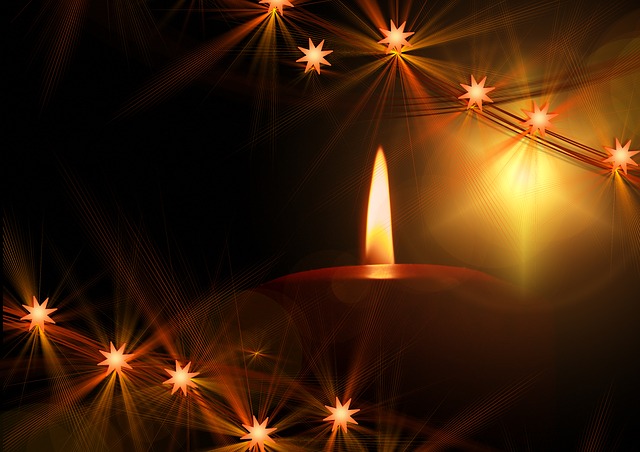The Holiday Season is supposed to be a time of joy and celebration. Families make a point to get together despite busy schedules to share this special time of year. We make memories to cherish for lifetimes. Childhoods of holidays spent with elders and extended family create holiday traditions for our special family during the Holidays.
And yet this is also the darkest time of the year with the coldest weather and the shortest days. Nature sleeps in winter, animals hibernate, and the world slows down. This is the time of introspection and endings. Traditionally, this is the time for the elderly and the sick to cross over to the world of Spirit, Heaven, the Other Side or whatever you may call the life beyond this one.
I am sure you know someone who has died between Halloween (All Hallow’s Eve) and the end of January—the darkest days of winter, with the Winter Solstice being on December 21st this year. The end of the year is the fitting ending time of life, of letting go, releasing from the cares of the world, moving into the next life and concluding that this life path has ended. Many elders and people who have struggled with illness find that the ties that hold them to this physical reality begin to loosen with the lessening of the daylight and the extending of the darkness of the night. Sleep welcomes them to rest in the peacefulness of the arms of the Divine Mother, the Angels and Great Spirit.
Great Spirit.
As some of you know, my elder sister has just crossed over. She is the first of my generation to leave our family. Anna Marie had been ill for a long until lung cancer metastasized into brain cancer. Then she progressed very quickly to the terminal stage, taking all medically necessary steps before dying suddenly. I supported whatever choices she made knowing her life was getting more difficult in a body that was bringing her daily pain. I am sad I could not be by her side but she knew I was with her in spirit. Other loving family members were present.
So how do those of us manage to celebrate the Holidays with grief in our hearts when everyone around us is laughing and happy and our hearts are still crying? This is not my first experience with Holiday sorrow. My first husband died 10 days before Christmas. My mother crossed over on New Year’s Eve. My father died in early February. ‘Tis the season for sorrow for me in many ways.
- Take time to Grieve. Do not avoid the grief in your heart. Honor the loss you feel. Many kind-hearted souls will try to comfort you but the truth is your life has an empty space your loved one held. Take the time you need to cry, be angry, be alone, hug the pillow, write a letter to them, talk about your loved one, rant at Creator for taking them away, take long walks in nature, go to your favorite places, or do whatever comforts you in the moment. Grief will pass in its own time. Ignoring or stuffing it will only prolong it—even during the holidays.
- Enjoy the Happy Moments. Even though you have lost a dear one, enjoy those precious moments that come along with family and friends during this joyous season. Family dinners or get-togethers sharing stories, good food or gifts bring up opportunities for shared laughter, happiness and comfort. Bask in the joy. There is no place for guilt because you are feeling good when a loved one is gone. Remember, they would have loved the joke, shared the hugs and enjoyed the kids’ antics. Be present in the moment to the good feelings too. “The trouble is you think you have time.” Buddha.
- Participate. Keep involved in the holiday spirit to the extent you are able. Put up your decorations remembering the times you shared. Go to choir practice, kids’ concerts and holiday events. Volunteer at your community affairs. Invite the family over or go to their homes if you don’t feel up to entertaining. Continue to participate in life-affirming activities. Yes, you need your alone time to grieve but do not cut yourself off from life. Your loved one wants you to continue with your life. Choosing to live a rich and full life is the best way to affirm the value of the life you have left and honor the loved one who has gone forward.
- Be Grateful. Be grateful for the time you had with your loved one who passed. Be grateful for the loved ones who remain behind. Be grateful for your good health, or the health you have remaining and appreciate what you can do and do what you can to improve it. Pass on what aid you can to other family or friends who need support during this time. Show your appreciation to those who you may have taken for granted. Life is full, rich and beautiful if we only look around and enjoy what we have.
Holidays can be difficult for all of us. There is pressure to be happy when we feel stressed by being too busy, too rushed, too chaotic, too much food, too much to drink, too many people and not enough time for ourselves and quiet time. The trauma of the loss of a loved one adds tremendous stress during this time. “Death is a challenge. It tells us not to waste time… It tells us to tell each other right now that we love each other.” Leo Buscaglia.
5. The best advice is to Take Care of Yourself. Nurture yourself. Pay attention to your needs. This is always good advice and is particularly relevant during the holidays when you are grieving a loss. And share your loss with family and friends. “A joy shared is multiplied; grief shared is divided. “Grief is in two parts. The first is loss. The second is the remaking of life.” Anne Roiphe.
If you have suffered a loss during this time, my heart goes out to you. Grief during the Holiday Season is more difficult to bear since we are expected to be cheerful and happy. But keep in mind that most everyone has lost a loved one at the end of the year. Not only is it the passing of the yeaAriar, it is the time for life’s passing. So, share your heart to ease your grief. Remember the good times with family and friends and make new memories now. Loving well while we are here creates legacies that live on in our descendants.
Many Blessings to you this Holiday Season, Ariann

